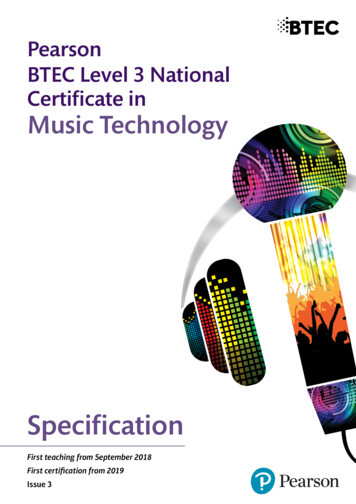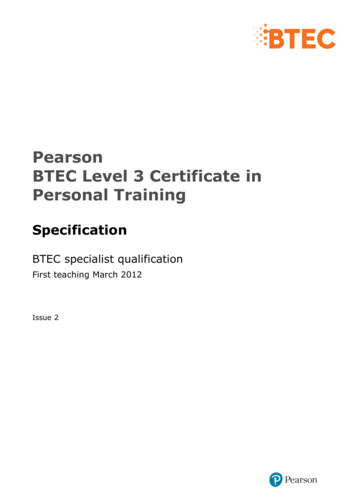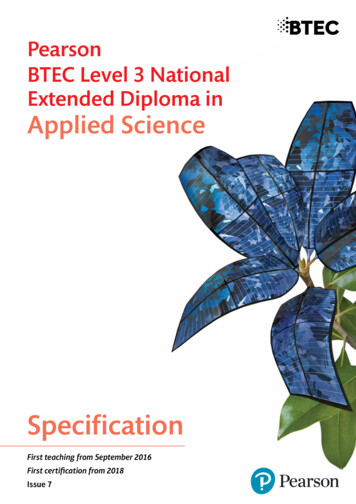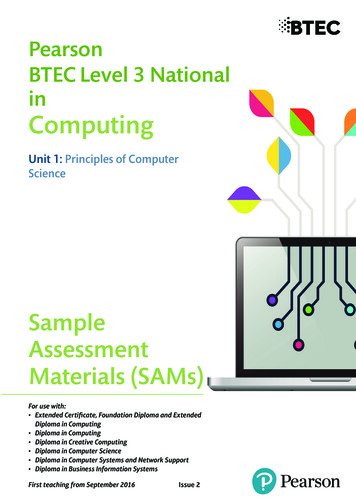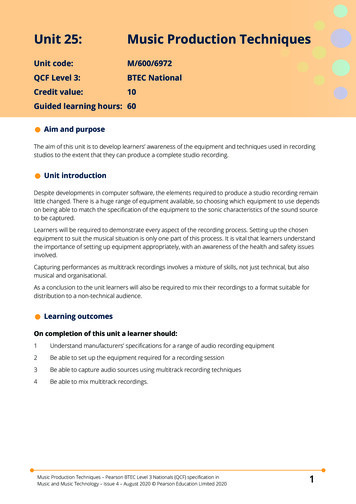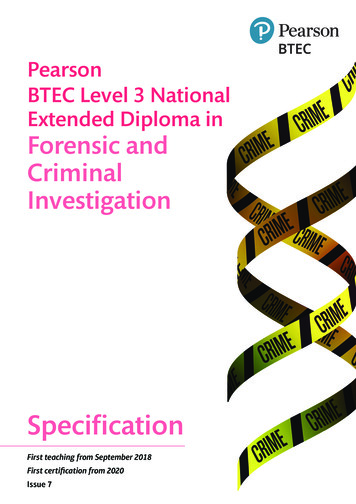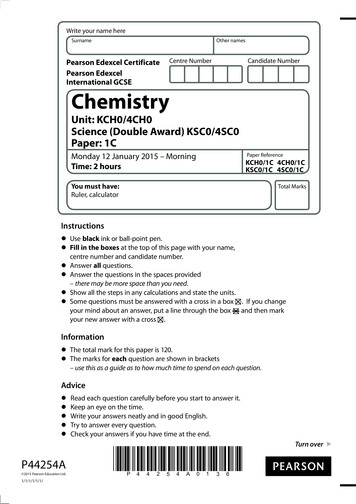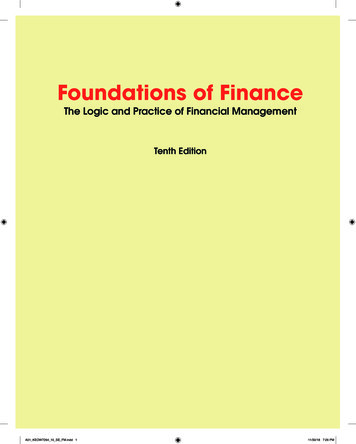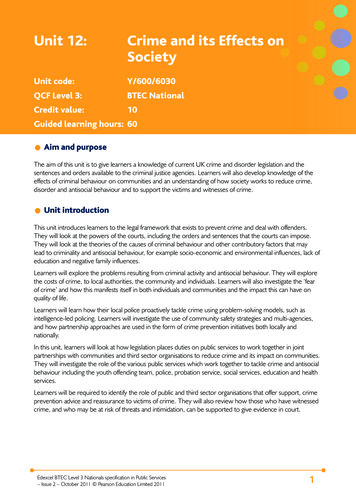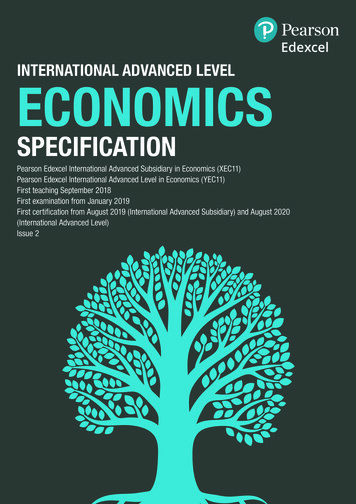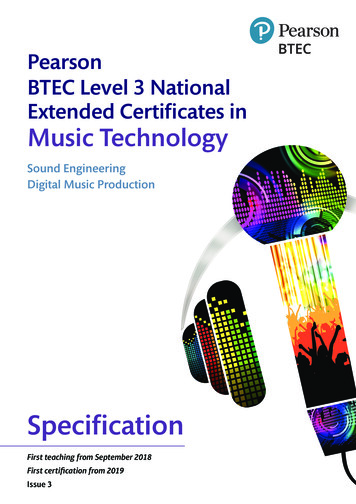
Transcription
PearsonBTEC Level 3 NationalExtended Certificates inMusic TechnologySound EngineeringDigital Music ProductionSpecificationFirst teaching from September 2018First certification from 2019Issue 3
PearsonBTEC Level 3 NationalExtended Certificates inSound EngineeringDigital Music ProductionSpecificationFirst teaching September 2018Issue 3
Edexcel, BTEC and LCCI qualificationsEdexcel, BTEC and LCCI qualifications are awarded by Pearson, the UK’s largest awarding bodyoffering academic and vocational qualifications that are globally recognised and benchmarked.For further information, please visit our qualifications website at qualifications.pearson.com.Alternatively, you can get in touch with us using the details on our contact us page atqualifications.pearson.com/contactusAbout PearsonPearson is the world's leading learning company, with 25,000 employees in more than 70 countriesworking to help people of all ages to make measurable progress in their lives through learning.We put the learner at the centre of everything we do, because wherever learning flourishes, so dopeople. Find out more about how we can help you and your learners at qualifications.pearson.comThis specification is Issue 3. We will inform centres of any changes to this issue. The latest issuecan be found on our website.References to third-party material made in this specification are made in good faith. We do notendorse, approve or accept responsibility for the content of materials, which may be subject tochange, or any opinions expressed therein. (Material may include textbooks, journals, magazinesand other publications and websites.)ISBN 978 1 446 94660 2All the material in this publication is copyright Pearson Education Limited 2021
WelcomeWith a track record built over 30 years of learner success, BTEC Nationals are widely recognisedby industry and higher education as the signature vocational qualification at Level 3. They provideprogression to the workplace either directly or via study at a higher level. Proof comes fromYouGov research, which shows that 62% of large companies have recruited employees with BTECqualifications. What’s more, well over 100,000 BTEC students apply to UK universities every yearand their BTEC Nationals are accepted by over 150 UK universities and higher education institutesfor relevant degree programmes either on their own or in combination with A Levels.Why are BTECs so successful?BTECs embody a fundamentally learner-centred approach to the curriculum, with a flexible,unit-based structure and knowledge applied in project-based assessments. They focus on theholistic development of the practical, interpersonal and thinking skills required to be able tosucceed in employment and higher education.When creating the BTEC Nationals in this suite, we worked with many employers, higher educationproviders, colleges and schools to ensure that their needs are met. Employers are looking forrecruits with a thorough grounding in the latest industry requirements and work-ready skills suchas teamwork. Higher education needs students who have experience of research, extended writingand meeting deadlines.We have addressed these requirements with: a range of BTEC sizes, each with a clear purpose, so there is something to suit eachlearner’s choice of study programme and progression plans refreshed content that is closely aligned with employers’ and higher education needs for askilled future workforce assessments and projects chosen to help learners progress to the next stage. This meanssome are set by you to meet local needs, while others are set and marked by Pearsonso that there is a core of skills and understanding that is common to all learners.For example, a written test can be used to check that learners are confident in usingtechnical knowledge to carry out a certain job.We are providing a wealth of support, both resources and people, to ensure that learners and theirteachers have the best possible experience during their course. See Section 10 for details of thesupport we offer.A word to learnersToday’s BTEC Nationals are demanding, as you would expect of the most respected applied learningqualification in the UK. You will have to choose and complete a range of units, be organised, takesome assessments that we will set and mark, and keep a portfolio of your assignments. But youcan feel proud to achieve a BTEC because, whatever your plans in life – whether you decide tostudy further, go on to work or an apprenticeship, or set up your own business – your BTECNational will be your passport to success in the next stage of your life.Good luck, and we hope you enjoy your course.
Collaborative developmentStudents completing their BTEC Nationals in music technology will be aiming to go on toemployment, often via the stepping stone of higher education. It was, therefore, essential thatwe developed these qualifications in close collaboration with experts from professional bodies,businesses and universities, and with the providers who will be delivering the qualifications.To ensure that the content meets providers’ needs and provides high-quality preparation forprogression, we engaged experts. We are very grateful to all the university and further educationlecturers, teachers, employers, professional body representatives and other individuals who havegenerously shared their time and expertise to help us develop these new qualifications.In addition, universities, professional bodies and businesses have provided letters of supportconfirming that these qualifications meet their entry requirements. These letters can be viewedon our website.Summary of Pearson BTEC Level 3 National Extended Certificatesin Sound Engineering and Digital Music Production specificationIssue 3 changesSummary of changes made between the previous issue and thiscurrent issuePagenumberThe last paragraph of the Qualification and unit content section has been amendedto allow centres delivering the qualification above to alter the content to reflect thecontext of the country where it is being delivered.Page 6If you need further information on these changes or what they mean, contact us via our website s.html.
ContentsIntroduction to BTEC National qualifications for the music technologysector1Total Qualification Time2Qualifications, sizes and purposes at a glance3Structures of the qualifications at a glance5Qualification and unit content6Assessment6Grading for units and qualifications8UCAS Tariff points81 Qualification purpose92 Structure133 Units16Understanding your units16Index of units194 Planning your programme1015 Assessment structure and external assessment112Introduction112Internal assessment112External assessment1126 Internal assessment114Principles of internal assessment114Operating internal assessment114Setting assessments through assignments115Making valid assessment decisions1167 Administrative arrangements119Introduction119Learner registration and entry119Access to assessment119Administrative arrangements for internal assessment120Administrative arrangements for external assessment121Dealing with malpractice in assessment123Certification and results125Additional documents to support centre administration1258 Quality assurance1269 Understanding the qualification grade12810 Resources and support133Support for setting up your course and preparing to teach133Support for assessment134Training and support from Pearson135Appendix 1 Links to industry standards137Appendix 2 Glossary of terms used for internally-assessed units138
Introduction to BTEC National qualificationsfor the music technology sectorThis specification contains the information you need to deliver the Pearson BTEC Level 3 Nationalextended certificates in sound engineering or digital music production. The specification signpostsyou to additional handbooks and policies. It includes all the units for these qualifications.These qualifications are part of the suite of music technology qualifications offered by Pearson.In the suite there are qualifications that focus on different progression routes, allowing learnersto choose the one best suited to their aspirations.All qualifications in the suite share some common units and assessments, allowing learners someflexibility in moving between qualifications where they wish to select a more specific progressionroute. The qualification titles are given below.Within this suite are BTEC National qualifications for post-16 learners wishing to specialise in aspecific industry, occupation or occupational group. The qualifications give learners specialistknowledge and technical skills, enabling entry to an Apprenticeship or other employment, orprogression to related higher education courses. Learners taking these qualifications musthave a significant level of employer involvement in their programmes.In the music technology sector these qualifications are:Pearson BTEC Level 3 National Extended Certificate in Sound Engineering (603/1233/6)Pearson BTEC Level 3 National Extended Certificate in Digital Music Production (603/1232/4)Pearson BTEC Level 3 National Foundation Diploma in Music Technology (540 GLH) (603/0211/2)Pearson BTEC Level 3 National Diploma in Music Technology (720 GLH) (601/7350/6)Pearson BTEC Level 3 National Extended Diploma in Music Technology (1080 GLH) (601/7351/8).Other BTEC National qualifications in this sector provide a broad introduction that gives learnerstransferable knowledge and skills. These qualifications are for post-16 learners who want tocontinue their education through applied learning. The qualifications prepare learners for a range ofhigher education courses either by meeting entry requirements in their own right or by beingaccepted alongside other qualifications at the same level and adding value to them. Learners mayprogress to one of the qualifications in this specification having completed a smaller qualificationthat provides suitable fundamental knowledge and skills.In the music technology sector this qualification is:Pearson BTEC Level 3 National Certificate in Music Technology (180 GLH) (603/2688/8).This specification signposts all the other essential documents and support that you need as acentre in order to deliver, assess and administer the qualification, including the staff developmentrequired. A summary of all essential documents is given in Section 7. Information on how we cansupport you with these qualifications is given in Section 10.The information in this specification is correct at the time of publication.Pearson BTEC Level 3 National Extended Certificates in Music Technology –Specification – Issue 3 – April 2021 Pearson Education Limited 20211
Total Qualification TimeFor all regulated qualifications, Pearson specifies a total number of hours that it is estimatedlearners will require to complete and show achievement for the qualification: this is the TotalQualification Time (TQT). Within TQT, Pearson identifies the number of Guided Learning Hours(GLH) that we estimate a centre delivering the qualification might provide. Guided learning meansactivities, such as lessons, tutorials, online instruction, supervised study and giving feedback onperformance, that directly involve teachers and assessors in teaching, supervising and invigilatinglearners. Guided learning includes the time required for learners to complete external assessmentunder examination or supervised conditions.In addition to guided learning, other required learning directed by teachers or assessors willinclude private study, preparation for assessment and undertaking assessment when not undersupervision, such as preparatory reading, revision and independent research.BTEC Nationals have been designed around the number of hours of guided learning expected.Each unit in the qualification has a GLH value of 60, 90 or 120. There is then a total GLH valuefor the qualification.Each qualification has a TQT value. This may vary within sectors and across the suite dependingon the nature of the units in each qualification and the expected time for other required learning.The following table show all the qualifications in this sector and their GLH and TQT values.2Pearson BTEC Level 3 National Extended Certificates in Music Technology –Specification – Issue 3 – April 2021 Pearson Education Limited 2021
Qualifications, sizes and purposes at a glanceTitleSize and structurePearson BTEC Level 3National Certificate inMusic Technology180 GLH (250 TQT)Equivalent in size to 0.5 ofan A Level.Two units, of which one ismandatory and one isexternal.Mandatory content (67%).External assessment(67%).Summary purposeThe qualification offers an introductionto the music technology sector throughapplied learning.The qualification supports progressionto higher education when taken as partof a programme of study that includesother vocational or generalqualifications. It is designed to supportprogression to employment followingfurther study at university.TitleSize and structureSummary purposePearson BTEC NationalExtended Certificate inSound Engineering360 GLH (520 TQT)Designed to support progression toapprenticeship or employment whentaken as part of a programme ofstudy that includes other appropriateBTEC Nationals or A Levels.Equivalent in size to oneA Level.5 units of which 2 aremandatory and 1 isexternal.Mandatory content (50%).External assessment (33%).Pearson BTEC NationalExtended Certificate inDigital Music Production360 GLH (500 TQT)Equivalent in size to oneA Level.5 units of which 2 aremandatory and 1 isexternal.Mandatory content (50%).External assessment (33%).Pearson BTEC NationalFoundation Diploma inMusic Technology540 GLH (755 TQT)Equivalent in size to 1.5A Levels.7 units of which 4 aremandatory and 2 areexternal.Mandatory content (66%).External assessment (44%).A basis of study for the soundengineering sector with a focuson studio recording techniquesand DAW production.Designed to support progression toapprenticeship or employment whentaken as part of a programme ofstudy that includes other appropriateBTEC Nationals or A Levels.A basis of study for the musicproduction sector with a focuson music and sound for mediaand DAW production.Designed as a one-year, full-timecourse covering the fundamentals inthe music technology sector withoptional areas of study, includingremixing and working as aproduction team.This qualification supports entry toemployment in the sector as well asprogression to a further year of studyat Level 3. It would also supportprogression to higher education iftaken as part of a programme of studythat included other BTEC Nationals orA Levels.Pearson BTEC Level 3 National Extended Certificates in Music Technology –Specification – Issue 3 – April 2021 Pearson Education Limited 20213
TitleSize and structureSummary purposePearson BTEC NationalDiploma in MusicTechnology720 GLH (1035 TQT)This qualification is designed to be thesubstantive part of a 16–19 studyprogramme for learners who want astrong core of music technology study.Equivalent in size to twoA Levels.10 units of which 5 aremandatory and 2 areexternal.Mandatory content (58%).External assessment (33%).This programme may include otherBTEC Nationals or A Levels to supportprogression either directly toemployment in the music technologysector or to higher education coursesin music technology. It can also be acomponent of the Tech Bacc measurealong with a Level 3 Mathematicsqualification and the Extended ProjectQualification (EPQ).The additional qualification(s) studiedallow learners to either give breadth totheir study programme by choosing acontrasting subject, or to give it morefocus by choosing a complementarysubject. This qualification can also beused to progress to employment inthis sector.Pearson BTEC Level 3National ExtendedDiploma in MusicTechnology41080 GLH (1525 TQT)Equivalent in size to threeA Levels.14 units of which 7 aremandatory and 3 areexternal.Mandatory content (61%).External assessment (33%).This qualification is designed to be themain focus of learning in a typicaltwo-year, 16–19 study programme.This size qualification is particularlyappropriate for those with an interestin progressing directly to a career inmusic technology or to enter thesector following a course in highereducation. Learners can choose areassuch as DJ performance techniques orcomposing music in order to focus onspecific careers in music technology.Pearson BTEC Level 3 National Extended Certificates in Music Technology –Specification – Issue 3 – April 2021 Pearson Education Limited 2021
Structures of the qualifications at a glanceThis table shows all the units and the qualifications to which they contribute. The full structure for this Pearson BTEC Level 3 National in Music Technologyis shown in Section 2. You must refer to the full structure to select units and plan your programme.KeyUnit assessed externallySESound EngineeringMMandatory unitsDMPUnit (number and title)OOptional unitsDigital Music undationDiplomaDiplomaExtendedDiploma(GLH)(180 GLH)(360 GLH)(540 GLH)(720 GLH)(1080 GLH)MMMMMMMMSE1Live Sound602Studio Recording Techniques60O3Music and Sound for Media60O4Music Technology Project1205Music Technology in Context1206DAW Production1207Music Technology Enterprise Opportunities1208Creative Synthesis and Sampling609Composing Music6010 Remixing and Reworking6011 DJ Performance Techniques6012 Music Technology in Performance6013 Mixing and Mastering Techniques6014 Studio Design and Acoustics6015 Music Investigation6016 Commercial Music Production6017 Music Technology and Musicianship6018 Working and Developing as a Production Team6019 Designing a Music Technology Product60Pearson BTEC Level 3 National Extended Certificates in Music Technology –Specification – Issue 3 – April 2021 Pearson Education Limited OOOOO5
Qualification and unit contentPearson has developed the content of the new BTEC Nationals in collaboration with employersand representatives from higher education and relevant professional bodies. In this way, we haveensured that content is up to date and that it includes the knowledge, understanding, skills andattributes required in the sector.Each qualification in the suite has its own purpose. The mandatory content provides a balance ofbreadth and depth ensuring that all learners have a strong basis for developing technical skillsrequired in the sector. Learners are then offered the opportunity to develop a range of technicalskills and attributes expected by employers with some opportunity to select between optional unitswhere a degree of choice for individual learners to study content relevant to their own progressionchoices is appropriate. It is expected that learners will apply their learning in relevant employmentand sector contexts during delivery and have opportunities to engage meaningfully with employers.The proportion of mandatory content ensures that all learners are following a coherent programmeof study and acquiring the knowledge, understanding and skills that will be recognised and valued.Learners are expected to show achievement across mandatory units as detailed in Section 2.BTEC Nationals have always required applied learning that brings together knowledge andunderstanding (the cognitive domain) with practical and technical skills (the psychomotor domain).This is achieved through learners performing vocational tasks that encourage the development ofappropriate vocational behaviours (the affective domain) and transferable skills. Transferable skillsare those such as communication, teamwork, planning and completing tasks to high standards,which are valued in both the workplace and in higher education.Our approach provides rigour and balance, and promotes the ability to apply learning immediatelyin new contexts. Further details can be found in Section 2.Centres should ensure that delivery of content is kept up to date. Some of the units withinthe specification may contain references to legislation, policies, regulations and organisations,which may not be applicable in the country you deliver this qualification in (if teaching outside ofEngland), or which may have gone out-of-date during the lifespan of the specification. In theseinstances, it is possible to substitute such references with ones that are current and applicablein the country you deliver subject to confirmation by your Standards Verifier.AssessmentAssessment is specifically designed to fit the purpose and objective of the qualification. It includesa range of assessment types and styles suited to vocational qualifications in the sector. There arethree main forms of assessment that you need to be aware of: external, internal and synoptic.Externally-assessed unitsEach external assessment for a BTEC National is linked to a specific unit. All of the units developedfor external assessment are 120 GLH to allow learners to demonstrate breadth and depth ofachievement. Each assessment is taken under specified conditions, then marked by Pearson and agrade awarded. Learners are permitted to resit external assessments during their programme. Youshould refer to our website for current policy information on permitted retakes.The styles of external assessment used for qualifications in the Music Technology suite are: set tasks – learners take the assessment during a defined window and demonstrateunderstanding through completion of a vocational task.Some external assessments include a period of preparation using set information. Externalassessments are available once or twice a year. For detailed information on the externalassessments please see the table in Section 2. For further information on preparing forexternal assessment see Section 5.6Pearson BTEC Level 3 National Extended Certificates in Music Technology –Specification – Issue 3 – April 2021 Pearson Education Limited 2021
Internally-assessed unitsMost units in the sector are internally assessed and subject to external standards verification.This means that you set and assess the assignments that provide the final summative assessmentof each unit, using the examples and support that Pearson provides. Before you assess you willneed to become an approved centre, if you are not one already. You will need to prepare to assessusing the guidance in Section 6.In line with the requirements and guidance for internal assessment, you select the mostappropriate assessment styles according to the learning set out in the unit. This ensures thatlearners are assessed using a variety of styles to help them develop a broad range of transferableskills. Learners could be given opportunities to: demonstrate practical and technical skills using appropriate equipment software/processes etc. complete realistic tasks to meet specific briefs or particular purposeswrite up the findings of their own researchuse case studies to explore complex or unfamiliar situationscarry out projects for which they have choice over the direction and outcomes.You will make grading decisions based on the requirements and supporting guidance given inthe units. Learners may not make repeated submissions of assignment evidence. For furtherinformation see Section 6.Synoptic assessmentSynoptic assessment requires learners to demonstrate that they can identify and use effectively,in an integrated way, an appropriate selection of skills, techniques, concepts, theories andknowledge from across the whole sector as relevant to a key task. BTEC learning has alwaysencouraged learners to apply their learning in realistic contexts using scenarios and realisticactivities that will permit learners to draw on and apply their learning. For these qualificationswe have formally identified units which contain a synoptic assessment task. Synoptic assessmentmust take place after the teaching and learning of other mandatory units in order for learners to beable to draw from the full range of content. The synoptic assessment gives learners an opportunityto independently select and apply learning from across their programmes in the completion of avocational task. Synoptic tasks may be in internally or externally assessed units. The particular unitthat contains the synoptic tasks for this qualification is shown in the structure in Section 2.Language of assessmentAssessment of the internal and external units for these qualifications will be available in English.All learner work must be in English. A learner taking the qualifications may be assessed in Britishor Irish Sign Language where it is permitted for the purpose of reasonable adjustment.For information on reasonable adjustments see Section 7.Pearson BTEC Level 3 National Extended Certificates in Music Technology –Specification – Issue 3 – April 2021 Pearson Education Limited 20217
Grading for units and qualificationsAchievement in the qualification requires a demonstration of depth of study in each unit, assuredacquisition of a range of practical skills required for employment or progression to higher education,and successful development of transferable skills. Learners achieving a qualification will haveachieved across mandatory units, including external and synoptic assessment.Units are assessed using a grading scale of Distinction (D), Merit (M), Pass (P), Near Pass (N) andUnclassified (U). The grade of Near Pass is used for externally-assessed units only. All mandatoryand optional units contribute proportionately to the overall qualification grade, for example a unit of120 GLH will contribute double that of a 60 GLH unit.Qualifications in the suite are graded using a scale of P to D*, or PP to D*D*, or PPP to D*D*D*.Please see Section 9 for more details. The relationship between qualification grading scales and unitgrades will be subject to regular review as part of Pearson’s standards monitoring processes on thebasis of learner performance and in consultation with key users of the qualification.UCAS Tariff pointsThe BTEC Nationals attract UCAS points. Please go to the UCAS website for full details of thepoints allocated.8Pearson BTEC Level 3 National Extended Certificates in Music Technology –Specification – Issue 3 – April 2021 Pearson Education Limited 2021
1 Qualification purposeIn this section you will find information on the purpose of these qualifications:Pearson BTEC Level 3 National Extended Certificate in Sound EngineeringPearson BTEC Level 3 National Extended Certificate in Digital Music ProductionOn our website we publish a full ‘Statement of Purpose’ for each qualification. These statements aredesigned to guide you and potential learners to make the most appropriate choice about the size ofqualification that is suitable at recruitment.Pearson BTEC Level 3 National Extended Certificate in Sound EngineeringWho is this qualification for?The Pearson BTEC Level 3 National Extended Certificate in Sound Engineering is intended as aTech Level qualification, equivalent in size to one A Level. It is designed to meet the Tech Baccmeasure if studied alongside Level 3 mathematics and the Extended Project Qualification (EPQ).This size of qualification allows learners to study related and complementary qualifications withoutduplication of content. It provides good preparation for learners considering an apprenticeship insound engineering. It supports access to a range of higher education courses in sound engineeringand the wider music industry when taken alongside further Level 3 qualifications.As well as direct entry to employment, this qualification will prepare learners for higher study of aspecialist degree or BTEC Higher National Diploma. This route gives learners the opportunity toenter the sector at a higher level, or in a more specialist role.No prior study of the sector is needed but learners should normally have a range of achievement atLevel 2, in GCSEs or equivalent qualifications, including English, mathematics and science.What does this qualification cover?The content of this qualification has been developed in consultation with employers and professionalbodies to ensure that it is appropriate for those interested in working in the sector. In addition,higher education representatives have been involved to ensure that it fully supports entry to therelevant range of specialist degrees.There are two mandatory units, which cover the following aspects of sound engineering: studio recording techniques digital audio workstation (DAW) production.Learners will be able to add three optional units, from a choice of four, to the mandatory content.These have been designed to support their progression to a range of employment opportunitiesin sound engineering, and to a range of higher education courses. Optional units will introducelearners to sector specialist areas of their choice, including working in particular environments,and link with relevant technical roles. The optional units cover areas such as: live soundmixing and mastering techniquesstudio design and acousticsworking and developing as a production team.While taking this qualification, learners will be required to engage with sector employers as partof their course, where they will be given opportunities to develop practical skills in preparationfor employment.What could this qualification lead to?This qualification will prepare learners for direct employment in the sound engineering sector and issuitable for those wanting to work in entry-level roles such as: live music assistant assistant sound engineer audiovisual technician/broadcast assistant.Pearson BTEC Level 3 National Extended Certificates in Music Technology –Specification – Issue 3 – April 2021 Pearson Education Limited 20219
If learners have taken additional Level 3 qualifications, they could increase their professionalindustry skills and competencies, and have increased responsibilities in the above job roles.Additional qualifications could in
4 Planning your programme 101 5 Assessment structure and external assessment 112 Introduction 112 Internal assessment 112 External assessment 112 6 Internal assessment 114 . extended certificates in s
